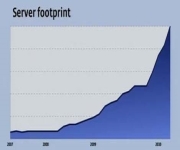Archive For June 28, 2010

Last week, I estimated that Facebook now had 50,000 servers in Facebook Software Use. Rich Miller of Datacenter Knowledge actually managed to sleuth out the accurate server count in: Facebook Server Count: 60,000 or more. He took Tom Cook’s Velocity 2010 talk from last week that showed growth without absolute numbers. But Rich noticed it…
The NoSQL movement continues to gain momentum. I don’t see these systems as replacing relational systems for all applications but it is also crystal clear that relational systems are a poor choice for some workloads. See One Size Does Not Fit All for my take on the different types of systems that make up the…
This morning I came across Exploring the software behind Facebook, the World’s Largest Site. The article doesn’t introduce new data not previously reported but it’s a good summary of the software used by Facebook and the current scale of the social networking site: · 570 billion page views monthly · 3 billion photo uploads monthly…

I’ve been talking about the application low-power, low-cost processors to server workloads for years starting with The Case for Low-Cost, Low-Power Servers. Subsequent articles get into more detail: Microslice Servers, Low-Power Amdahl Blades for Data Intensive Computing, and Successfully Challenging the Server Tax Single dimensional measures of servers like “performance” without regard to server cost…
A couple of days ago I came across an interesting article by Microsoft Fellow Mark Russinovich. In this article, Mark hunts a random Internet Explorer crash with his usual tools: The Case of the Random IE Crash. He chases down the IE issue to a Yahoo! Toolbar. This caught my interest for two reasons: 1)…
One of the most important attributes needed in a cloud solution is what I call cloud data freedom. Having the ability to move data out of the cloud quickly, efficiently, cheaply, and without restriction is a mandatory prerequisite in my opinion to trusting a cloud. In fact, you need the ability to move the data…
Last month I wrote about Solving World Problems with Economic Incentives. In that post I talked about the power of economic incentives when compared to regulatory body intervention. I’m not really against laws and regulations – the EPA, for example, has done some good work and much of what they do has improved the situation….
Industry trends come and go. The ones that stay with us and have lasting impact are those that fundamentally change the cost equation. Public clouds clearly pass this test. The potential savings approach 10x and, in cost sensitive industries, those that move to the cloud fastest will have a substantial cost advantage over those that…